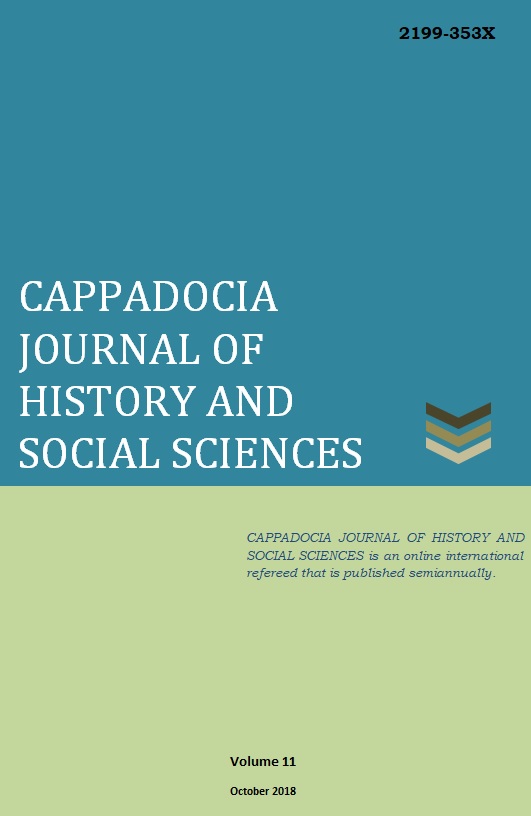Author :
Abstract
Bu çalışma Hun ve Han devletleri arasındaki diplomatik ilişkileri ve bunun aracısı olan elçileri konu edinmektedir. Tarihteki Türk devletlerinden biri olarak kabul edilen Hun’lar ve Çin devleti olan Han’lar arasındaki ilişkinin tüm yansımaları diplomaside ve elçilerde görülür. Devletler arasında elçi göndermenin bir takım amaçları ve sonuçları olduğu açıktır. Bu nedenle Hun’larda yabancı elçilere takınılacak tavırlara bazen meclislerde karar verilmiştir. Gerek Hun gerekse Han devletinde elçilerin sahip oldukları belgeler görevlerinin resmi nitelik taşıdığını göstermektedir. Bu nedenle bu belgeler ait oldukları devletin de gücünü yansıtan birer araçlardır. Bir devletin başka bir devlet tarafından tanınması, barış antlaşmaları veya savaş tehdidi gibi konularda etkin olan elçilerin seçimi ve kimliği de son derece önemlidir. Hun ve Han devletlerinin birbirlerine gönderdiği elçilerde bazı nitelikler aradığı anlaşılmaktadır. Hun devletinin kendisine gelen elçilerde asalet ve unvan gibi değerlere dikkat ettiği, ayrıca bunlarla ilişkiler konusunda bir takım protokol kurallarına uyduğu yine elçilerden de bunların beklendiği anlaşılmaktadır. Bu kuralların uygulanması veya değiştirilmesi hususunda devletlerin içinde bulundukları siyasi ve askeri gücün temel belirleyicilerden olduğu anlaşılmaktadır. Hun ve Han devleti arasında çeşitli sebeplerle gönderilen elçiler arasında casus ve istihbaratçı nitelikleri öne çıkan kimseler olması nedeniyle bazen cezalandırılmaları da söz konusu olmuştur. Bu elçilerin alıkonularak uzun yıllar gözlem altında tutulması veya tutsak edilmesi yada sürgün edilmesi gibi çeşitli ceza usullerinin uygulandığı görülmektedir. Elçilerin öldürülmemesi hususunda her iki devletin de son derece titiz davrandığı görülmektedir. Bu nedenle elçilerin ölüm hadiseleri son derece azdır.
Keywords
Abstract
This study deals with the diplomatic relations between the Huns and the Han Dynasty and the envoys mediating these relations. The relations between the Huns, considered to be one of the Turkish states in history, and the Han Dynasty, which is a Chinese state, were reflected in diplomacy and envoys. It is clear that sending envoys between states had a number of aims and consequences. For this reason, attitudes towards foreign envoys in the Huns were sometimes decided in the councils. The documents of the envoys in both Hun and Han states showed that their missions had been of an official nature. Therefore, these documents are instruments that reflect the power of the state they belong to. The selection and identity of the envoys, who were effective in matters such as recognition of a state by another state, peace treaties and threats of war, were also extremely important. It is understood that Hun and Han states looked for certain qualities in the envoys sent to each other. Apparently, the Huns paid attention to values such as nobility and title in the envoys visiting them, and also complied with certain rules of protocol in these relations, while expecting the envoys to comply with the same rules. It is understood that the political and military power of the states were the main determinants of the implementation or modification of these rules. As there were those with prominent features of spies and intelligence agents among the envoys sent between the Huns and the Han Dynasty for a variety of reasons, they were sometimes punished. It is observed that these envoys had been kept in custody or taken prisoner for many years or various criminal procedures such as exile had been exercised. Both states had paid utmost attention to not kill the envoys. Therefore, deaths of envoys were extremely rare.
Keywords
- BECKWITH Christopher I., İpek Yolu İmparatorlukları, Odtü Yayıncılık, Ankara 2011.
- BIELENSTEIN, Hans, Diplomacy and Trade in The Chinese World 589-1276, Brill Academic, 2005.
- DONUK, Abdülkadir, Türklerde İdari- Askeri Unvan ve Terimler, , TDAV., Ġstanbul 1988.
- DONUK, Abdülkadir, “Türk Devletinde Hakimiyet AnlayıĢı”, TED, c . X-XI, S. 10, 1979, ss. 30-56.
- DURMUġ, Ġlhami, Türk Kültürüne Giriş, Akçağ Yayınları, Ankara 2016.
- EBERHERD, Wolfram, Çin Tarihi, TTK Yay.4.Baskı, Ankara, 2007.
- Ġstanbul 1976.
- GÖMEÇ, Saadettin, Türk Kültürünün Ana Hatları, Akçağ Yayınları, Ankara 2006.
- GÖMEÇ, Saadettin, Türk Hun Tarihi, Berikan Yayınevi, Ankara 2012.
- Ġstanbul 2011.
- GROUSSET, Rene, Bozkır İmparatorluğu, çev: ReĢat Uzmen, Ötüken Yayınları, Ġstanbul 2006.
- GUMILEV, L. N. , Hunlar, Çev. Ahsen Batur, Selenge Yayınları, Ġstanbul 2013.
- Asya Türk Tarihi Araştırmaları, Haz. Erkin Ekrem- Serhat Küçük, TTK. Yayınları, Ankara 2014, ss.95-137.
- Serhat Küçük, TTK. Yayınları, Ankara 2014, ss.333-341.
- KAFESOĞLU, Ġbrahim, Türk Milli Kültürü, Ötüken Yayınları, Ġstanbul 1978.
- KLYASHTORNY, S.G. - T.Ġ. Sultanov, Türkün Üç Bin Yılı, Selenge Yayınları, Ġstanbul 2004.
- KÜYEL, Mübahat Türker, “Bilge Kağan Bir Filozof-Arhant mudur?”, XI. TTKong, 1994, ss. 455-464.
- LIGETI, L., Bilinmeyen İç Asya, çev. Sadrettin Karatay, TDK. Yay. Ankara 1986.
- MORĠ, Masao, “Kuzey Asyada‟ki Eski Bozkır Devletlerinin TeĢkilatı” ,TED., S.9, 1978, ss. 209-227.
- ONAT, AyĢe- Orsoy, Sema- Ercilasun, Konuralp, Han Hanedanlığı Tarihi, TTK. Yayınları, Ankara 2004.
- Ankara 2012.
- ÖGEL, Bahaeddin, Büyük Hun İmparatorluğu Tarihi, Cilt:1, 2, TTK. Yayınları, Ankara 2015.
- NEMETH, Gyula, Attila ve Hunları, çev. ġerif BaĢtav, DTCF. Yayınları No: 318, Ankara 1982.
- Yayınları, Ġstanbul 2014, ss.167-201.
- TAġAĞIL, Ahmet, Gök-Türkler II, TTK. Yayınları, Ankara 1999.
- TAġAĞIL, Ahmet, Kök -Tengri’nin Çocukları, Bilge Kültür Sanat, Ġstanbul 2015.
- Yayınları, Ġstanbul 2006.





